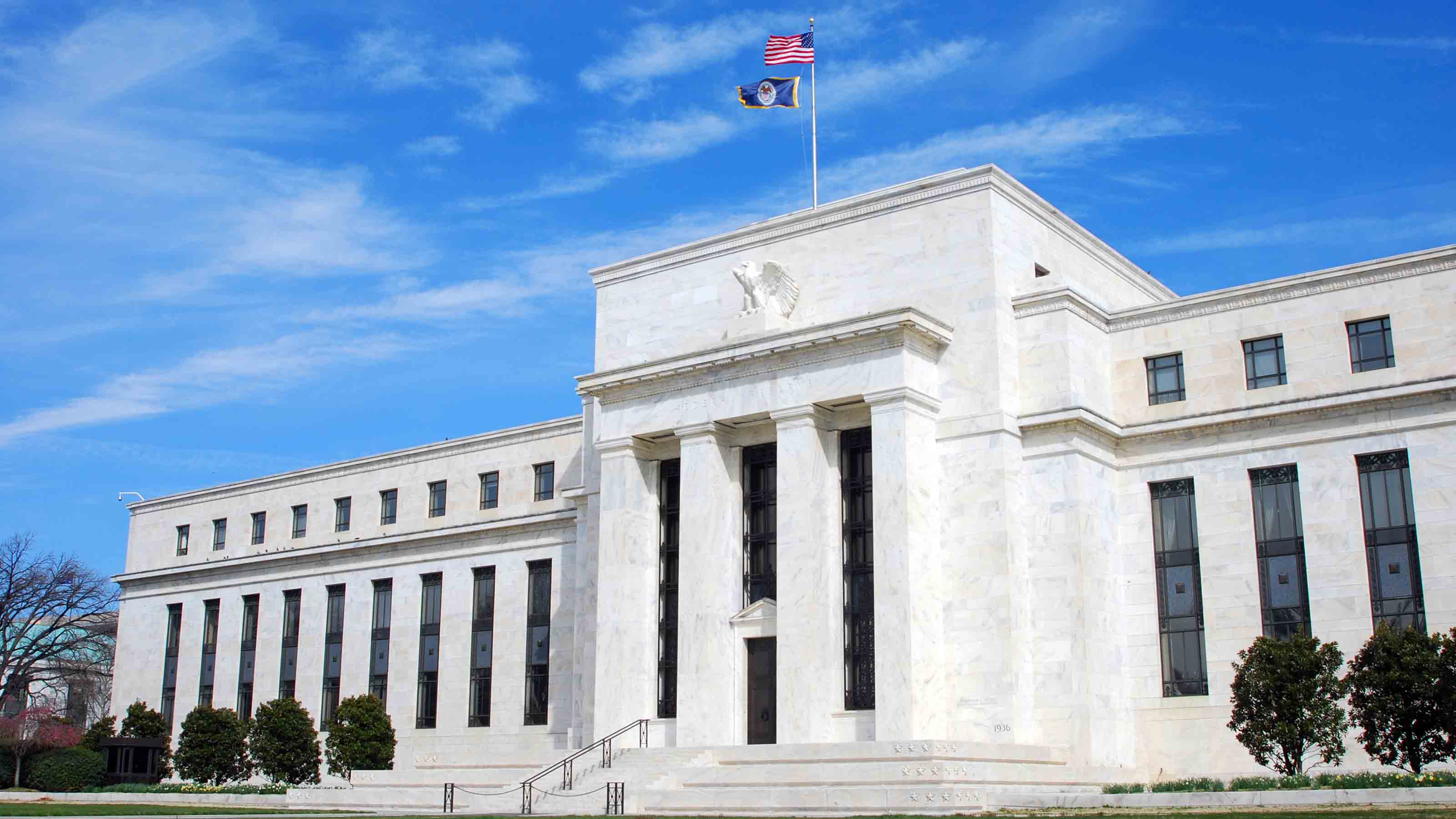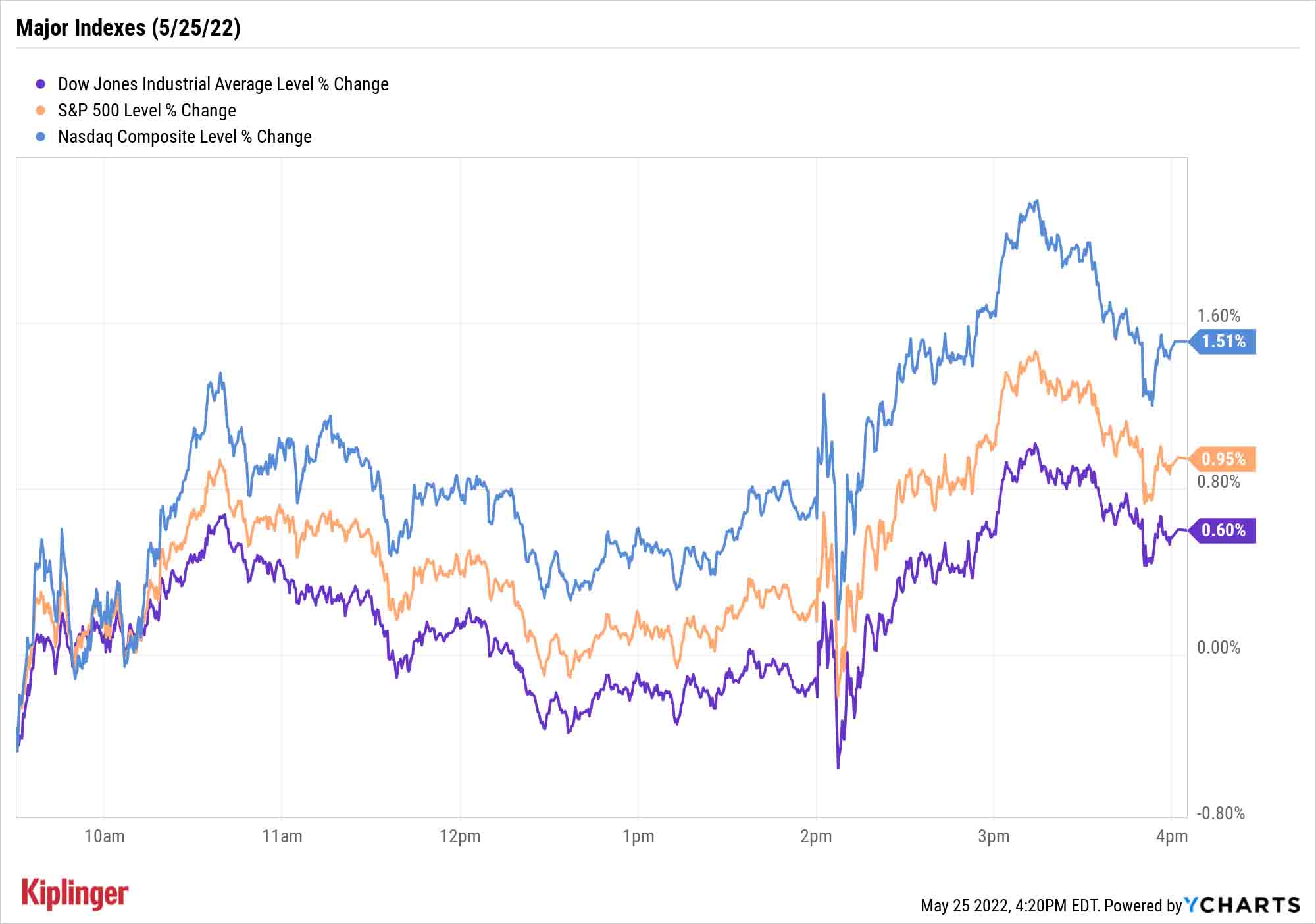Stock Market Today: Nasdaq Jumps as Fed Minutes Fail to Flame Fears
Investors acted with relief Wednesday at the Federal Reserve's seeming flexibility on the future of rate hikes and other policy tightening.


Profit and prosper with the best of Kiplinger's advice on investing, taxes, retirement, personal finance and much more. Delivered daily. Enter your email in the box and click Sign Me Up.
You are now subscribed
Your newsletter sign-up was successful
Want to add more newsletters?

Delivered daily
Kiplinger Today
Profit and prosper with the best of Kiplinger's advice on investing, taxes, retirement, personal finance and much more delivered daily. Smart money moves start here.

Sent five days a week
Kiplinger A Step Ahead
Get practical help to make better financial decisions in your everyday life, from spending to savings on top deals.

Delivered daily
Kiplinger Closing Bell
Get today's biggest financial and investing headlines delivered to your inbox every day the U.S. stock market is open.

Sent twice a week
Kiplinger Adviser Intel
Financial pros across the country share best practices and fresh tactics to preserve and grow your wealth.

Delivered weekly
Kiplinger Tax Tips
Trim your federal and state tax bills with practical tax-planning and tax-cutting strategies.

Sent twice a week
Kiplinger Retirement Tips
Your twice-a-week guide to planning and enjoying a financially secure and richly rewarding retirement

Sent bimonthly.
Kiplinger Adviser Angle
Insights for advisers, wealth managers and other financial professionals.

Sent twice a week
Kiplinger Investing Weekly
Your twice-a-week roundup of promising stocks, funds, companies and industries you should consider, ones you should avoid, and why.

Sent weekly for six weeks
Kiplinger Invest for Retirement
Your step-by-step six-part series on how to invest for retirement, from devising a successful strategy to exactly which investments to choose.
U.S. equities enjoyed a broad pop Wednesday following the release of minutes from the Federal Reserve's most recent meeting, which showed that the central bank's decisionmakers were willing to be both aggressive but flexible in the face of both inflationary and recessionary pressures.
Much of what the Federal Open Market Committee said in the minutes was largely as expected: Members favor 50-basis-point increases to the Fed's benchmark interest rate in both its June and July meetings, then could pull back to quarter-point raises in subsequent meetings.
"It's very clear that bringing down inflation was (and is) the focus at the Fed's May meeting; Chair Powell has reinforced the need to expeditiously raise rates toward broad estimates of 'neutral,' as risks to inflation still tilt to the upside," says Bob Miller, BlackRock's head of Americas Fundamental Fixed Income. "We think that after the July meeting, the Fed is likely to become more data-dependent with regard to rate hikes, which essentially means that the policy path after July will depend upon (a) the trajectory of inflation and (b) progress toward correcting the supply/demand imbalances in the labor market."
From just $107.88 $24.99 for Kiplinger Personal Finance
Become a smarter, better informed investor. Subscribe from just $107.88 $24.99, plus get up to 4 Special Issues

Sign up for Kiplinger’s Free Newsletters
Profit and prosper with the best of expert advice on investing, taxes, retirement, personal finance and more - straight to your e-mail.
Profit and prosper with the best of expert advice - straight to your e-mail.
While the minutes reinforce what has largely weighed on stocks in 2022 – that the central bank will continue to tighten policy – the Fed's seeming flexibility helps assuage another growing fear: that of an American recession.
"Elevated risk of a recession is another reason why the Fed could end their rate hike cycle earlier than expected," says Bill Adams, chief economist for Comerica Bank. "Financial conditions are much tighter than at the start of the year, the economy faces big shocks to disposable income and exports from the Russia-Ukraine war, and housing is starting to turn."
Forceful rebounds by the likes of Tesla (TSLA, +4.9%), Amazon.com (AMZN, +2.6%) and Nvidia (NVDA, +5.1%) – the latter of which was due to report earnings after Wednesday's close – lifted the beat-up Nasdaq Composite 1.5% to 11,434. The S&P 500 gained 1.0% to 3,978, putting more distance between it and the bear-market threshold. And the Dow Jones Industrial Average closed 0.6% higher to 32,120.

Other news in the stock market today:
- The small-cap Russell 2000 rocketed 2.0% higher to 1,799.
- U.S. crude oil futures gained 0.5% to settle at $110.33 per barrel.
- Gold futures fell 1% to end at $1,846.30 an ounce, snapping a four-day win streak.
- Bitcoin improved by 1% to $29,627.77. (Bitcoin trades 24 hours a day; prices reported here are as of 4 p.m.)
- Wendy's (WEN) jumped 9.8% after Trian Fund Management – an asset management firm founded by billionaire investor Nelson Peltz – said that it had advised the fast food chain's board of directors that it plans to "explore and evaluate" strategic options, including a potential buyout, as a means of boosting shareholder value. Trian is WEN's biggest stakeholder, owning 25.3 million shares, or 11.8% of the company, according to S&P Global Capital Intelligence. Peltz, meanwhile, has a 4.7% stake in Wendy's. "We are unsurprised by Peltz's appetite, but would not hastily give WEN away," says Wedbush analyst Nick Setyan, who maintained an Outperform (Buy) rating on the stock and kept Wendy's on the Wedbush Best Ideas List.
- It was another big day for retail earnings, with Dick's Sporting Goods (DKS) stock particularly volatile after its results. Shares were down by 11% at one point after the athletic apparel retailer cut its full-year outlook (now expecting earnings per share to arrive between $9.15 and $11.70, down from $11.70 to $13.10; and for same-store sales to be 2%-4% lower vs. flat) amid sizzling inflation and ongoing supply-chain challenges. However, DKS ended the day up 9.7% after CEO Lauren Hobart said the guidance reflected management being "appropriately cautious," and that the company's fundamentals remain strong. Indeed, DKS reported higher-than-expected earnings and revenue in its first quarter ($2.85 per share, $2.7 billion actual vs. $2.48 per share, $2.59 billion estimate). "We still believe the company is well positioned over the next few years to take market share and return capital to shareholders through dividends (now yielding roughly 3.0%) and share repurchases," says CFRA Research analyst Zachary Warring, who kept a Buy rating on the retail stock.
Healthcare: A Steady Helping Hand
Is this latest upturn for real or just a headfake? That remains to be seen, but the overall outlook is hardly positive from here.
Strategists are fairly split among whether the U.S. falls into a recession – and if it does, whether that recession will hit in 2022, 2023 or even 2024. But even those who expect America to avoid an economic decline don't see a rosy short-term path. For instance, Jeffrey Roach, chief economist for LPL Financial, says that while "the U.S. will likely escape recession this year, [it will] only grow at a modest clip as we expect inflation to start taking a bigger toll on consumer spending."
Again: Upside largely seems to lie with those stocks that can pass the buck on to consumers. Savita Subramanian, head of equity and quantitative strategy at BofA Securities, views that as a core trait of healthcare stocks, not to mention their overall defensive stance.
"We believe the sector is well-positioned amid looming recession risks," she says. "Healthcare offers growth, defense, and yield at a reasonable price: GARP (growth at a reasonable price), DARP (defense at a reasonable price), and YARP (yield at a reasonable price)."
As we approach summertime, we're looking out toward the back half of 2022 – and that includes reviewing each sector for opportunities. Read on as we highlight a dozen healthcare picks that appear to fit this turbulent investing environment.
Kyle Woodley was long AMZN and NVDA as of this writing.
Profit and prosper with the best of Kiplinger's advice on investing, taxes, retirement, personal finance and much more. Delivered daily. Enter your email in the box and click Sign Me Up.
Kyle Woodley is the Editor-in-Chief of WealthUp, a site dedicated to improving the personal finances and financial literacy of people of all ages. He also writes the weekly The Weekend Tea newsletter, which covers both news and analysis about spending, saving, investing, the economy and more.
Kyle was previously the Senior Investing Editor for Kiplinger.com, and the Managing Editor for InvestorPlace.com before that. His work has appeared in several outlets, including Yahoo! Finance, MSN Money, Barchart, The Globe & Mail and the Nasdaq. He also has appeared as a guest on Fox Business Network and Money Radio, among other shows and podcasts, and he has been quoted in several outlets, including MarketWatch, Vice and Univision. He is a proud graduate of The Ohio State University, where he earned a BA in journalism.
You can check out his thoughts on the markets (and more) at @KyleWoodley.
-
 Nasdaq Leads a Rocky Risk-On Rally: Stock Market Today
Nasdaq Leads a Rocky Risk-On Rally: Stock Market TodayAnother worrying bout of late-session weakness couldn't take down the main equity indexes on Wednesday.
-
 Quiz: Do You Know How to Avoid the "Medigap Trap?"
Quiz: Do You Know How to Avoid the "Medigap Trap?"Quiz Test your basic knowledge of the "Medigap Trap" in our quick quiz.
-
 5 Top Tax-Efficient Mutual Funds for Smarter Investing
5 Top Tax-Efficient Mutual Funds for Smarter InvestingMutual funds are many things, but "tax-friendly" usually isn't one of them. These are the exceptions.
-
 Nasdaq Leads a Rocky Risk-On Rally: Stock Market Today
Nasdaq Leads a Rocky Risk-On Rally: Stock Market TodayAnother worrying bout of late-session weakness couldn't take down the main equity indexes on Wednesday.
-
 Stocks Make More Big Up and Down Moves: Stock Market Today
Stocks Make More Big Up and Down Moves: Stock Market TodayThe impact of revolutionary technology has replaced world-changing trade policy as the major variable for markets, with mixed results for sectors and stocks.
-
 Small Caps Step Up, Tech Is Still a Drag: Stock Market Today
Small Caps Step Up, Tech Is Still a Drag: Stock Market TodayEarly strength gave way to AI skepticism again as a volatile trading week ended on another mixed note.
-
 AI Unwind Takes 2% Off the Nasdaq: Stock Market Today
AI Unwind Takes 2% Off the Nasdaq: Stock Market TodayMarkets are paying more and more attention to hyperscalers' plans to spend more and more money on artificial intelligence.
-
 Big Change Coming to the Federal Reserve
Big Change Coming to the Federal ReserveThe Lette A new chairman of the Federal Reserve has been named. What will this mean for the economy?
-
 Strong Jobs Report Leaves Markets Flat: Stock Market Today
Strong Jobs Report Leaves Markets Flat: Stock Market TodayInvestors, traders and speculators are taking time to weigh the latest labor market data against their hopes for lower interest rates.
-
 Job Growth Sizzled to Start the Year. Here's Why It's Unlikely to Impact Interest Rates
Job Growth Sizzled to Start the Year. Here's Why It's Unlikely to Impact Interest RatesThe January jobs report came in much stronger than expected and the unemployment rate ticked lower to start 2026, easing worries about a slowing labor market.
-
 I'm a 55-Year-Old Dad. Here’s How My 28-Year-Old Daughter Showed Me That AXP Is Still a Solid Investment
I'm a 55-Year-Old Dad. Here’s How My 28-Year-Old Daughter Showed Me That AXP Is Still a Solid InvestmentAmerican Express stock is still a solid investment because management understands the value of its brand and is building a wide moat around it.
